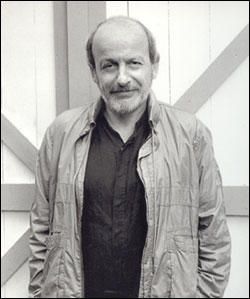WHO WRITES SHORT SHORTS?
 MARK HELPRIN
MARK HELPRIN
SAM SHEPARD
Every year Writer's Digest Magazine has a contest for very short stories (1500 words or under). Last year was the first year I entered with a story called "Emily's Dad." I didn't win, but at least I understood why the winning story walked away with the $3,000 Grand Prize. It was a work of subtlety and symbolic meaning--all under 1500 words.
The deadline is December 1, and as I've been mulling over what kind of piece I might like to write and submit, the school year began and I used a short story in our anthology to have my students write a practice literary analysis paragraph. The story was called "White Gardens" by Mark Helprin. It involved a memorial service for six firefighters who lost their lives when a building collapsed while they were trying extinguish the fire. It was mostly from the point-of-view of one of the widows, what she saw, what she thought, and what she was able to take away from the service, especially from the priest's eulogy. The interesting thing, however, is at one point the priest goofs up his words. Instead of saying that the deceased firefighters will repose in green gardens (meaning go to a more beautiful and peaceful reward when they die), he is very young and becomes emotionally overcome by the proceedings and says that they will repose in white gardens. Much of the story concerns everyone--the priest included--trying to figure out what he meant by "white gardens."
I wanted a short piece to use as an example of a quality story my students could analyze, but what I realized is that the story had everything I was looking for in a piece I might write and submit to the Writer's Digest contest: not only conflict and resolution, but brevity, depth, symbol, specific sensory detail, and emotion.
I decided I wanted to use this story as a model for the story I would write. But I wanted to tear it apart and see what made it tick. So I took the story and home and retyped it. Just to get the feel of typing a high quality short short. I wanted to see if I noticed anything about the rhythm of writing such a story from start to finish (I didn't).
I thought it would exceed the minimum word count, but it didn't. It came in just over 900 words. Once I double-spaced it and printed it up, I knew I could use it to analyze why it was such a good story. My plan (as it is with everything I read for analysis) was to mark it up and identify many of the issues that I listed above. Having done that, my theory goes, I might be more apt (that means likely, John) to write a better story.
I'm also planning on doing the same thing with a short short called "The Devouring Lion" by Pulitzer Prize winning writer and actor Sam Shepard. It concerns a man who goes back to work driving a Caterpillar earth mover after a nervous breakdown because a woman left him. It comes in at about three pages, but is a powerful piece of writing. Sam Shepard has always been one of my favorites.
I'm almost done with the YA novel, though, so maybe I won't send anything to this contest. Who knows?
At least writing and sending a story is the plan. Stay tuned.
Labels: authors, flash fiction, writing practice


